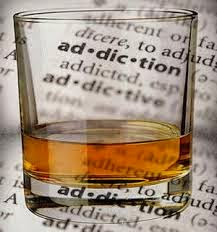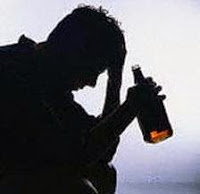Alcoholism is a chronic and often progressive disease that includes problems controlling your drinking, being preoccupied with alcohol, continuing to use alcohol even when it causes problems, having to drink more to get the same effect (physical dependence), or having withdrawal symptoms when you rapidly decrease or stop drinking. If you have alcoholism, you can't consistently predict how much you'll drink, how long you'll drink, or what consequences will occur from your drinking.
~ Mayo Clinic
It’s fitting, I suppose, to be posting about alcoholism a few days after one of the most popular drinking days in America, St. Patrick’s Day. Although I used to drink to excess – and not just on March 17 – thankfully those days are behind me now. It’s not because I came to believe that a power greater than myself could restore me to sanity, though, or because I prayed, made amends to those I had wronged, embraced abstinence or had a spiritual awakening.
It was only when it became clear to me that I was making life harder for myself and those around me that I made a concerted effort to learn how and when to put on the brakes. I admit that it took a while. But it wasn’t a result of my asking God to remove this character defect. I came to rely on myself.
I was sentenced to Alcoholics Anonymous meetings more than once as a result of impaired driving convictions. I dutifully obtained the necessary signatures from meeting chairs that proved to my probation officers that I had adhered to the directives of the court. I learned the Serenity Prayer, endured secondhand cigarette smoke and held hands with strangers at the end of each meeting. I even secured a sponsor – although I can count on one hand how many times I spoke with him – and earned my chip for a year of sobriety. But I was just going through the motions and bluffing my way through meetings and conversations. I didn’t like thinking of myself as a helpless victim of my addiction and I resented being forced by a judge to accept that I could only master my problem by relying on a Higher Power. (I remember being told that “higher power” isn’t necessarily “God” but rather can represent whatever works for a particular individual. It could even be a bedpan, one AA meeting attendee offered.) So I faked it.
For the uninitiated, here are AA’s Twelve Steps:
1. We admitted we were powerless over alcohol—that our lives had become unmanageable.
2. Came to believe that a Power greater than ourselves could restore us to sanity.
3. Made a decision to turn our will and our lives over to the care of God as we understood Him.
4. Made a searching and fearless moral inventory of ourselves.
5. Admitted to God, to ourselves, and to another human being the exact nature of our wrongs.
6. Were entirely ready to have God remove all these defects of character.
7. Humbly asked Him to remove our shortcomings.
8. Made a list of all persons we had harmed, and became willing to make amends to them all.
9. Made direct amends to such people wherever possible, except when to do so would injure them or others.
10. Continued to take personal inventory, and when we were wrong, promptly admitted it.
11. Sought through prayer and meditation to improve our conscious contact with God as we understood Him, praying only for knowledge of His will for us and the power to carry that out.
12. Having had a spiritual awakening as the result of these steps, we tried to carry this message to alcoholics, and to practice these principles in all our affairs.
Do these look like they would work for anyone struggling with alcoholism? Would they work for you?
Another thing that didn’t work for me was AA’s built-in program protector. If you express doubt or resistance or display the ability to question and think for yourself, you’re labeled a “dry drunk” who’s “in denial.” You’re marginalized. You’re not working the steps, you’re told, or you haven’t “hit rock bottom” yet. Things had to get worse before they could get better. Well, I didn’t want anything to get worse. I didn’t want to lose my job or kill someone on the road or hurt caring family members any more than I already had. I didn’t want to end up hospitalized – I wanted to learn how to get my drinking under control before I hit rock bottom. So I learned how in spite of Bill W., not because of him. (Bill Wilson founded Alcoholics Anonymous in 1938.)
This was years ago. I still drink more wine than I should at times. Just like I occasionally exceed the speed limit and eat more turkey on Thanksgiving than is wise. No one’s insisting that I abstain from driving or eating, however; why teetotalism is in so many folks’ view the only real answer to excessive drinking is a mystery to me. Must be because Catholics, Presbyterians and Mormons are so influential.
My experiences with AA came to mind the other day when I reposted an interesting article in Facebook entitled, “The Irrationality of Alcoholics Anonymous” by Gabrielle Glaser. The article – which points out that researchers have debunked AA doctrine and found dozens of other methods to address alcoholism to be more effective, and challenges the prevailing wisdom that AA “cures” most of its adherents – contained the following assertions that stayed with me:
"Nowhere in the field of medicine is treatment less grounded in modern science."
"Alcoholics Anonymous was established in 1935, when knowledge of the brain was in its infancy. It offers a single path to recovery: lifelong abstinence from alcohol."
"The history of AA is the story of how one approach to treatment took root before other options existed, inscribing itself on the national consciousness and crowding out dozens of newer methods that have since been shown to work better."
The article also claims that AA’s actual success rate probably doesn’t exceed 8 percent. (Given that 78.4 percent of U.S. adults identify as Christian, it surprises me that it isn’t higher.) So much for the 95 percent success rate that one meeting chairperson assured me.
The reaction of Facebookers to my posting the article was mixed. Comments included:
- "AA isn't for everyone, but it works well for many (even agnostics like me)."
- "I've never seen that kind of judgment in AA from those that are truly in recovery. If you leave the program, that’s okay. We understand it is not for everyone and never judge if you come back. That's why it was my path to get sober."
- "I think that the single digit success rate of AA is pretty damned accurate."
- "Don't like it, don't go. Don't criticize as if they have anything but pure motives."
- "I've been around alcoholics all my life...the ones that accomplished the rewards of sobriety went cold turkey on their own."
- "When the courts send everyone there who has an alcohol-related crime, it will water down the success rate. But what is the point of the criticism?"
- "AA, as the article notes, is non-profit, non-political and has no agenda. In fact, one of their core principles is that the AA system should never be professionalized. If AA were a self-serving for-profit group, then I would have a more negative opinion of them."
- "The problems start with the many for-profit treatment centers that have kept the trappings of AA while abandoning the non-profit nature. Those are the types of entities that the article should properly call on the carpet."
- "So many have been helped!"
- "There is such stigma attached to substance abuse and mental health disorders. It's too bad that treatment options for either are so limited and kept so hidden. Someone suffering from diabetes would not be looked down upon, nor would they attend a 12 step program in hopes of curing or controlling the disease, but groups seem to be the expected route in substance issues."
- "Wonderful program that has helped so many...thinking not one program can help everyone every time..."
- "Going on 22 years with AA and therapy. AA says it's NOT the only way and 'we know only a little.' Those who contend otherwise are violating the very tenets of their own program."
- "Living in a family of alcoholics. I think the most important things is a support group and non-judgmental friends."
- "It’s a disease for sure and new ideas, treatments and questions are necessary. It’s sure not a cookie cutter answer for everyone and help is so needed for addiction's victims and their family and friends."
- "Amen. Great article. How come when I say this stuff, I'm just an asshole that didn't work the program?"
- "I think it's an effective organization and method that has more than proved itself."
- "We need more scientifically proven therapies mostly. I think it is great if AA helps people, but if it does not help a huge segment of alcoholics, we need additional programs."
- "I want to like this about 17, 293 times."
In 1989 I came across Rational Recovery’s The Small Book, an “alternative for overcoming alcohol and drug dependence.” (AA’s “Bible” is nicknamed The Big Book.) Rational Recovery, which was designed as a direct counterpoint to AA, was based on cognitive behavior therapy, not “working the steps” or admitting anything to God. While abstinence was the goal in RR too, it regarded excessive alcohol consumption as a behavior, not a disease, and rejected the idea that alcoholics were forever “in recovery.” RR phased out group meetings in 1999 – I never attended one – and its website now focuses more on its “Addictive Voice Recognition Technique” but back when I was struggling with sobriety, knowing that there was a viable alternative to AA was encouraging.
I’m not trying to offend or belittle the five to eight percent of problem drinkers whose lives have been saved by Alcoholics Anonymous. And I readily admit that the fellowship and goodwill one feels at AA meetings is very cool and comforting. But I don’t believe a faith-based, non-scientific, abstinence-only approach should be the only way we address alcohol abuse or that members of government’s judicial branch should sentence anyone and everyone to a single program that's built around submission to God.
The foreword to the Third Edition of the Big Book concludes this way: “Each day, somewhere in the world, recovery begins when one alcoholic talks with another alcoholic, sharing experience, strength, and hope.”
Doesn’t sound like they’re powerless to me.
Sources: The Small Book: A Revolutionary Alternative for Overcoming Alcohol and Drug Dependence by Jack Trimpey; Alcoholics Anonymous Big Book: The Basic Text for Alcoholics Anonymous, Third Edition; TheAtlantic.com, U.S. Centers for Disease Control, Pew Research Center.






For some people that have succumbed to the excesses of alchoholism, going to AA and believing that group therapy and complete abstinence has helped them...your article basically seems to contradict their plan for a better life without alcohol. I don't think that you mean to totally disregard AA as a recovery group as you have indicated. But for the people it HAS worked for...more power to them and their belief system!
ReplyDelete